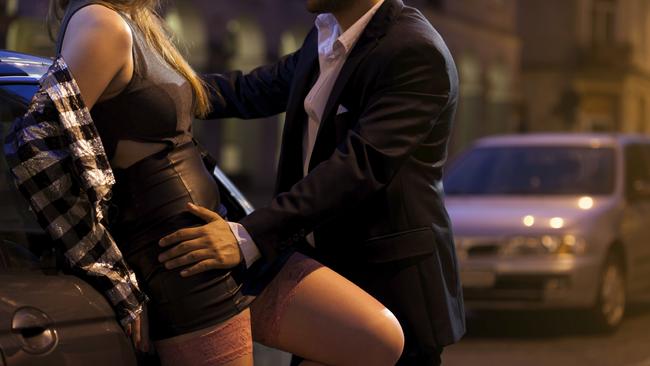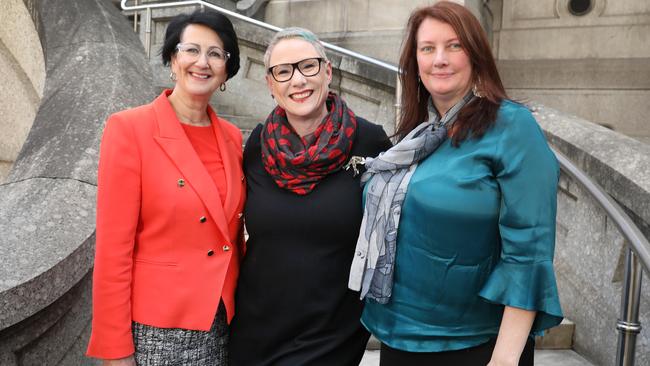Police charges for sex work in 2017-18 were triple the number from any previous year
POLICE have charged more than 200 people with sex work in the past year, more than triple the number last year — just as the issue of legalising it is headed for parliamentary debate. TAKE OUR POLL
- Attorney-General to champion sex work decriminalisation bid
- New Bill to legalise sex work introduced by Greens
- Bill to decriminalise sex work passes Upper House
- Protesting sex workers demand laws to decriminalise prostitution
THE number of people charged with sex-work offences has tripled in just 12 months after a “heavy-handed” and unexplained police crackdown on prostitution.
Officers are raiding an average of one suspected brothel every two days, and laid more than 200 charges related to sex work in the past 12 months.
Sex workers claim the huge jump is driven by a desire to demonise the industry ahead of parliamentary debate about whether it should be legalised.
Figures obtained by The Advertiser show police laid 211 sex work-related charges in the 2017-18 financial year.

According to police data tabled in Parliament in 2017, the number of sex work-related charges laid in a single calendar year has not exceeded 75 in the past 10 years.
The ability for police to enter brothels would be reined in under legislation that would see the industry decriminalised, introduced in State Parliament by Greens MP Tammy Franks.
Police Commissioner Grant Stevens has previously expressed concern brothels could become “criminal sanctuaries” if sex work was legalised. Of the 211 charges laid in 2017-18, 98 were for keeping a brothel, while 74 were for receiving money in a paid brothel.
Eleven money laundering charges were laid, while a further 24 were for “being on a premises frequented by prostitutes”. Police did not disclose what the other four charges were for.
Sex worker advocacy group SIN said the raiding of 175 suspected brothels in 2017-18 was part of a “heavy-handed” policing approach over the last 18 months that was sending the sex work industry further underground.
“How much of taxpayers’ money is wasted on dragging otherwise law-abiding citizens through the criminal justice system, clogging up the courts and leaving hundreds of people with a criminal history which will follow them for life?” SIN manager Sharon Jennings said.
She said the raids and charges meant sex workers had “more fear toward the police and are less likely to ask for help if we need it.”
Asked to justify the increase in charges, a police spokeswoman would not comment on the “methodology of policing brothels”.
“However, it should be noted that SAPOL are responsible for the enforcement of the state’s laws as they stand,” the spokeswoman said.
In a submission to a parliamentary committee last May, the police commissioner expressed concern about the industry being monitored by local councils or other regulators.
“SAPOL use a variety of covert and overt techniques to investigate and apprehend criminals involved in the industry,” Mr Stevens said.
“Many of those techniques are not available to council or other regulators.”
“The proposed Bill would significantly diminish legislative oversight of the sex work industry, raising concerns that serious and organised crime elements would infiltrate and flourish in the industry with limited risk of detection.”

Ms Franks said the “extraordinary” figures showed South Australia’s sex work laws were “way out of step with community expectations”.
“Police are spending a lot of time raiding brothels when they should be stopping domestic violence or street crime. Consenting adults in hotel rooms should not be our police’s top priority,” she said.
Liberal MP Dennis Hood, who has previously voted against decriminalising sex work, said the level of police activity meant legislation that would limit police oversight of brothels should “not get the vote of any MP”.
Ms Franks’ Bill is expected to be debated by the Upper House later this year. It mirrors a Bill proposed by Liberal MP Michelle Lensink, which passed the Upper House in 2017.
SEX WORK CHARGES LAID BY POLICE IN 2017-18 FINANCIAL YEAR
■ Keeping a brothel — 98
■ Receiving money in a paid brothel — 74
■ Being on a premises frequented by prostitutes — 24
■ Money laundering — 11
■ Unknown — 4
Total 211
SEX-WORK RELATED CHARGES LAID IN PREVIOUS YEARS
■ 2016 — 27
■ 2015 — 36
■ 2014 — 17
■ 2013 — 42
■ 2012 — 35
■ 2011 — 50
■ 2010 — 24
■ 2009 — 41
■ 2008 — 70
■ 2007 — 75
Raids on suspected brothels in 2017-18 — 175
